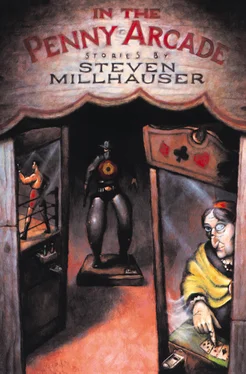Judith rose early the next morning and came down to breakfast at seven-fifteen in jeans and hiking boots. Her melancholy companion was not there, and Judith had the wickedly pleasurable sense that she would drag herself out of bed with a headache a little before noon. It occurred to Judith that she did not much care for the company of single women; there had been a time when they were her only friends. After breakfast she set off at once along the steepest trail, which still lay in shadow. It led high above the lake to a stone tower with a view. Despite the early hour there were already many strollers on the path, and she smiled at a gray-haired couple whom she recognized from the dining hall. “Fine morning,” the man said, touching his fingertips to his temple in a little salute. His blue-eyed wife, whose gray bangs looked like a row of commas, at once remarked vigorously, as if in contradiction: “I think it’s a wonderful morning!” Suddenly Judith stepped into the sun. She felt like flinging herself onto the grass at the side of the path, she felt like rolling over and over, but instead she continued climbing. She burst out laughing: she had caught herself humming “Zippity doodah.” She wondered when she had last thought of it. With startling vividness she saw Uncle Remus with a bluebird on his shoulder. Judith rested in a sunny gazebo, where she looked down at the long, massive lodge and at the lake, half in sun and half in shade, that stretched along one wing and under the veranda, and then she continued up to the tower. In the bright grass at the foot of the tower six teenagers in patched and faded jeans, three boys and three girls, lay on their backs with their eyes closed. It was windy and their hair moved a little over their immobile sunstruck faces. Judith climbed the winding stone stairs to the top and emerged from a shelter in the center of the round tower. Half a dozen people were already there. At the parapet she looked down at the teenagers, the lake, and the lodge. In the lake a few rowboats were out. She watched one pass from shade to sun. She began to walk slowly round the tower for a view of the valley on the other side, and as she passed into the shadow of the stairway shelter she saw the woman in bright sunlight not ten feet away. She wore a black sweater and a dark blue wraparound with pale blue and purple swirls. She stood conspicuously alone, staring out over the valley with her hands resting on the stone parapet.
Judith made a motion as if to retreat, but stopped herself. It was too silly to sneak away; there was no reason for it. But still she hesitated, wondering whether to stride boldly over and look at the view. The woman remained strangely motionless, and the wild thought struck Judith that she knew she was being observed, knew in fact that Judith was there. But that was mad. The woman moved suddenly, but it was only to lean forward and place her forearms on the parapet, bringing one foot behind the other and balancing it on the toe. Judith stepped to a portion of parapet that did not give the best view of the valley and was separated by a good distance from her solitary companion. She stared fixedly down for what seemed many minutes, gradually leaning forward and placing her arms on the parapet. She became aware of her pose and irritably straightened up. The woman still leaned on the parapet, staring into the distance.
Judith spent the rest of the morning following a long trail that led deep into the wooded hills. Sometimes the trail grew so narrow that the overarching white oaks, beeches, and Norway maples, which she identified with the aid of A Field Guide to Trees and Shrubs , shut out all but a few trembling spots of sun. Sometimes it led her to the edges of sun-dazzled, perilous cliffs, where nothing grew but yellowing grass and pink thistles. On one such cliff Judith rested on sun-warmed stone. She stretched out her legs, leaned back on her hands, and lifted her face, with closed eyes, to the sun. The hot mid-morning sun, the richly blue sky, and the distant hills seemed to flow into her and wash her clean, as if she had accumulated an inner grime. When she opened her eyes she saw a white butterfly on her knee.
The trail did not end, but went in a great loop that led back to the lodge. On her return she began to pass more and more people, moving in both directions: the day crowd, already out in force. The noisy crowd irritated her, for it seemed a rude interruption of her peace, but as she came in sight of the great veranda, thronged with visitors, her impatience gave way to a sense of the festive. She was in too good a humor to spurn the crowd-energy she felt all about her. She walked along the gravel path at the edge of the lake and climbed the steps at the side of the veranda. Children ran up and down the long porch, stopping to lean over the rail and point at the water. A little girl in a pink dress and black patent-leather shoes was dragging behind her a clattering yellow duck on red wheels. A tall, thin, very pale man burst suddenly into deep, hearty laughter. Through the side door she entered the sunny lounge, where people strolled back and forth, talking and laughing. She saw the elderly couple that she had passed early in the morning and gaily waved. When she entered the dining hall she saw that it was filled, and she approached her table with a pleasurable sense of proprietorship. Her dark companion had not yet returned for lunch. In the crowded and lively room Judith felt both soothed and excited, and she ate hungrily the handsomely served items of her lunch: a cup of onion soup, slices of small sweet rye and pumpernickel, a crab salad, and a French pastry so shamefully sweet that she vowed to hike vigorously all afternoon. But it felt good to sit lazily over her coffee; her thigh muscles were a little sore. The table beside her remained empty, and it seemed to Judith that the woman was deliberately spurning the crowd — striking an attitude on some lonely cliff.
After lunch Judith sat in a sunny corner of the veranda. Her long hike had pleasantly tired her, and she was tempted to sit for hours in the cushioned wicker armchair, feeling the sun on her arms and face and listening to the sounds about her: the knock of heels on the wood of the porch, the shouts of children, the creak of wicker furniture, the opening and closing of the side door leading to the lounge. The temptation to remain was so great that she forced herself up, reminding herself that the next day was her last. Perhaps it would rain. She followed a trail in the opposite direction from her morning’s hike, one that led past the tennis courts and into the woods. The wooded trail led to a rushing brook; over it was a shady wooden bridge, flecked with sunlight. Judith stood on the bridge, looking at the bits of sun moving on her hand and at the stones under the clear water. She crossed over and continued on the trail. Here and there wooden benches were placed at the side of the path. A smaller path led off the main trail, and Judith turned into it. It was shady and quiet. The path wound in and out. As Judith rounded a turn, she saw the woman seated on a bench. Judith was so startled that she drew in her breath sharply, and the woman turned to look at her. She had been reading a book, which she continued to hold up in both hands with her arms pressed against her sides as she sat with her head turned a little awkwardly toward Judith, who for a moment, in her surprise and alarm, had come to a full stop. The woman’s eyes were melancholy and kind.
“You startled me,” Judith said, and broke into stride.
“I hadn’t meant to,” the other said gently, but Judith was already past.
She hiked in the woods for several hours before deciding to turn back. Her little encounter had upset her, and she hesitated to return along the path that led to the stream. She felt irritated at her hesitation, made up her mind that she didn’t care whom she passed, and was relieved to discover a new path leading back to the tennis courts. In her room she washed her face and lay down on the sunny bed for five minutes with her arm over her eyes. Then she picked up The Machining of Plastics and went down to the veranda. It was far too noisy for her to work. Consulting her map, she decided to take a twisting path that led down through a beech grove and a meadow to a pond. She had not yet come to the beech grove when, suddenly on her right, she saw a red-slatted bench in a sunflooded bend of the path.
Читать дальше












